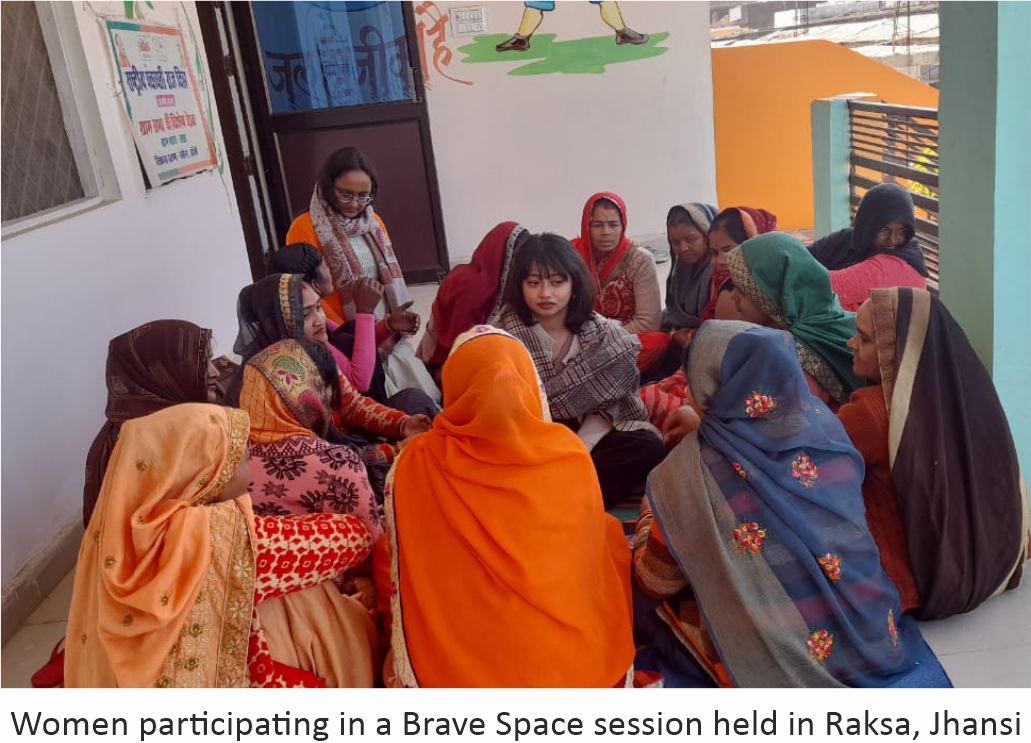The Need to Listen!
India
is traditionally a patriarchal society where women have been given secondary
status. This is reflected in the economic, social and political spheres of
the country (Singh and Singh 2020). Although in recent times there are
examples of stakeholders such as civil society and multi-lateral
organisations focusing on women empowerment and women rightfully staking
their claim to becoming independent, we are still far from enabling access
of ‘choice’ to women in some pockets of the nation.
 With this realisation that a new empowerment story is needed where women are
the creators and narrators of the story themselves, Brave Space was created.
It is a tool co-created with the women community and aims to build
solidarity among women to enable them to overcome socio-economic barriers by
voicing their aspirations and forging common narratives of empowerment.
Development Alternatives’ recent Brave Space in Raksa, Jhansi has been a
reality check. The session began with laughter and ended with the
realisation that the road to equality and equity is still distant, but not
far within reach. Brave Space saw participation from 18 women of which 17
were married and 1 was a college student. All the participants were between
22 and 55 years of age. The sense of solidarity reflected the aspirations of
the women whose voices otherwise would not be heard.
With this realisation that a new empowerment story is needed where women are
the creators and narrators of the story themselves, Brave Space was created.
It is a tool co-created with the women community and aims to build
solidarity among women to enable them to overcome socio-economic barriers by
voicing their aspirations and forging common narratives of empowerment.
Development Alternatives’ recent Brave Space in Raksa, Jhansi has been a
reality check. The session began with laughter and ended with the
realisation that the road to equality and equity is still distant, but not
far within reach. Brave Space saw participation from 18 women of which 17
were married and 1 was a college student. All the participants were between
22 and 55 years of age. The sense of solidarity reflected the aspirations of
the women whose voices otherwise would not be heard.
The session began with the women sharing conversations about their daily routines. Snippets of their lives pre- and post-marriage reflected a highly self-sacrificing life after marriage. The participants spoke about their lack of ability to make a choice for ‘self’. Major challenges that repetitively emerged were household responsibilities keeping them engaged throughout the day, low self-confidence, limited exposure to initiate new economic activities, little support from in-laws and partners being alcoholics.
Out of the 18 women, only 2 were engaged in economic activities. One had a kirana shop while the other one was into tailoring. When one of the mothers-in-law present shared her motivation to begin her entrepreneurial journey, the facilitator asked if she would also encourage her daughter-in-law too in venturing into the same path. Surprisingly, the mother-in-law believed that her 26-year-old daughter-in-law had yet to finish her ‘wifely duties’. This makes it clear that we are still at a juncture where a woman’s capability is defined by her ability as a caregiver and where the caregiving duties gatekeep their economic opportunities. This systemic cycle keeps perpetuating when more often than not women who have been deprived of similar opportunities become gatekeepers for other women.
Brave Space enables continuous-shared solidarity that is built on trust and openness. It holds the ability to unearth the aspirations of women beyond barriers just like in the case of Ravi Sen, Pragya Devi and many more. Through Brave Spaces, women are able to explore the shared narratives, create an understanding of ‘not alone’ and extract motivation that is crucial to pioneer micromovements of change towards self-awareness and entrepreneurship of choice.
Reference
Singh, S., and A. Singh. 2020. Women empowerment in India: a critical analysis. Tathapi 19(44), PP. 227−253.
Chand Bardewa
cbardewa@devalt.org